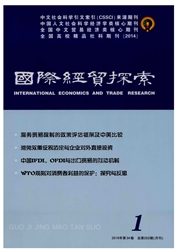

 中文摘要:
中文摘要:
文章分析了汇率政策对货币政策的传导机理,在此基础上,选取2005-2015年度的月度数据,对汇率政策对货币政策的传导特征进行了实证检验与敏感度分析,并给出了相关政策建议。研究表明:(1)汇率政策对货币政策的传导效应呈现显著的数量型特征,汇率政策对货币供给量存在显著影响,但汇率政策对利率不存在显著影响。(2)长期来看,汇率政策对货币供给量具有负向影响,货币供给量已成为汇率政策对货币政策传导的重要载体。短期来看,汇率政策对货币供给量具有正向影响,但货币供给量在汇率政策对货币政策传导中的载体功能还是有效的。(3)在纠偏速度层面,汇改前后货币供给量与外汇储备均存在长期正向均衡关系,一旦货币供给量短期内偏离与外汇储备的长期均衡关系,则货币供给量回归到长期均衡状态的反向纠偏速度将从汇改前的0.6528%提升到汇改后的3.3367%,反向纠偏速度提升了5.11倍。在响应速度层面,货币供给量对外汇储备冲击的响应速度从汇改前的第10期达到最大响应值提前到汇改后的第6期达到最大响应值,响应速度提高了66.67%。可见,汇改前后中国汇率政策对货币政策的传导敏感度出现大幅提升,足以说明中国实施人民币汇率形成机制改革已取得很大成效。
 英文摘要:
英文摘要:
This paper analyzes the transmission mechanism to exchange rate policy to monetary policy, on basis of which, it gives the empirical research on the transmission characteristics of exchange rate policy to monetary policy and further sensitive analysis, above on which, it designs relative policy suggestion. This research result shows: (1)The transmission effect of exchange rate policy to monetary policy has significant quantitative type characteristics, and exchange rate policy has a significant impact on money supply, but it doesnt have a significant impact on interest rate. (2) Money supply has become an important transmission carrier of exchange rate policy to monetary policy, and exchange rate policy has a negative impact on money supply in long term, but it has a positive impact on money supply in short term. (3) Before and after the exchange rate reform, the reverse rectification policy back to long-term equilibrium relationship with exchange speed of Chinese monetary rate policy has increased by 5.11 times, and the response speed to the impact of exchange rate policy has increased by 66.67%, and the transmission sensitivity of Chinese exchange rate policy to monetary policy has increased significantly, which suggests that China has made great achievements in the reform of RMB exchange rate formation mechanism. This research result will offer important theoretical guidance and decision- making reference for Chinese government to scientifically constructing and implementing monetary policy and exchange
 同期刊论文项目
同期刊论文项目
 同项目期刊论文
同项目期刊论文
 期刊信息
期刊信息
